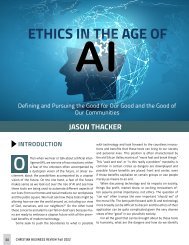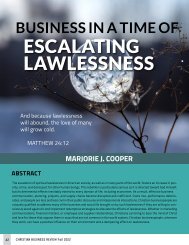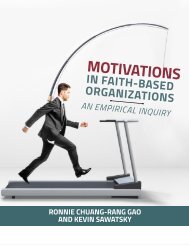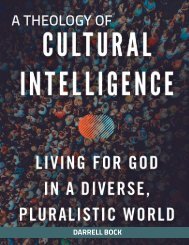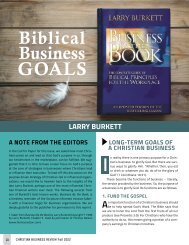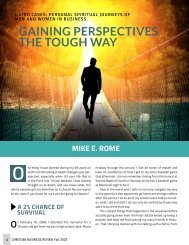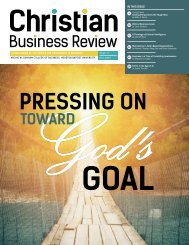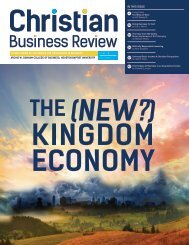Christian Business Review 2018: Kingdom Business in the Brave New World (Issue 7)
You also want an ePaper? Increase the reach of your titles
YUMPU automatically turns print PDFs into web optimized ePapers that Google loves.
communication technologies<br />
CBR PEER REVIEWED ARTICLES<br />
particular worth on humank<strong>in</strong>d. Thus <strong>in</strong> relationships we<br />
should seek to recognize <strong>the</strong> particular worth – <strong>the</strong> imago<br />
Dei – of ano<strong>the</strong>r person.<br />
A second <strong>the</strong>ological pr<strong>in</strong>ciple derived from <strong>the</strong> creation<br />
narrative with implications for relationships is that<br />
each member of <strong>the</strong> Godhead is <strong>in</strong> relationship with <strong>the</strong><br />
o<strong>the</strong>r members of <strong>the</strong> Tr<strong>in</strong>ity. We see this allusion when<br />
God says, “Let us make man <strong>in</strong> our image…” 6 A foundational<br />
view of God <strong>in</strong> Scripture is one of be<strong>in</strong>g <strong>in</strong> relationship<br />
- we see <strong>the</strong> three persons of <strong>the</strong> Tr<strong>in</strong>ity <strong>in</strong>teract<strong>in</strong>g<br />
and commun<strong>in</strong>g with one ano<strong>the</strong>r. So we too are designed<br />
to be <strong>in</strong> relationship with God and with each o<strong>the</strong>r. When<br />
God sees that Adam is alone s<strong>in</strong>ce no animal was like him,<br />
God says “It is not good,” 7 and creates for Adam a partner<br />
<strong>in</strong> Eve. To <strong>the</strong> extent that technology allows us to communicate<br />
better and to develop and ma<strong>in</strong>ta<strong>in</strong> relationships,<br />
it may be one avenue through which we can live out God’s<br />
purposes for humanity.<br />
The third <strong>the</strong>ological<br />
pr<strong>in</strong>ciple<br />
is derived from<br />
<strong>the</strong> Creation Mandate<br />
(sometimes<br />
referred to as <strong>the</strong><br />
Cultural Mandate),<br />
where God<br />
tells Adam and<br />
Eve to “Be fruitful<br />
and <strong>in</strong>crease <strong>in</strong> number; fill <strong>the</strong> earth and subdue it. Rule<br />
over <strong>the</strong> fish of <strong>the</strong> sea and <strong>the</strong> birds of <strong>the</strong> air and over<br />
every liv<strong>in</strong>g creature that moves on <strong>the</strong> ground.” 8 Later<br />
God gives Adam <strong>the</strong> responsibility to name <strong>the</strong> animals.<br />
These commands require that humans cont<strong>in</strong>ue creative<br />
activities that God began. We are <strong>in</strong>vited to use our creative<br />
energies to cultivate <strong>the</strong> raw materials of creation <strong>in</strong>to<br />
someth<strong>in</strong>g new. While <strong>the</strong>re may be obvious implications<br />
of <strong>the</strong> Creation Mandate for reproduction and agricultural<br />
cultivation, many <strong>the</strong>ologians have also understood it to<br />
apply to every aspect of humanity’s creative impulses, from<br />
physical artifacts such as mak<strong>in</strong>g clo<strong>the</strong>s, build<strong>in</strong>g houses,<br />
and creat<strong>in</strong>g art, to organizational policies and practices,<br />
to creat<strong>in</strong>g government structures 9 - and yes, even creat<strong>in</strong>g<br />
technology. God could have created a computer tree<br />
from which we ga<strong>the</strong>r hardware and software, but <strong>in</strong>stead<br />
chose to provision <strong>the</strong> world perfectly, and <strong>in</strong>vited us <strong>in</strong>to<br />
<strong>the</strong> creative process. The human creation of technology is<br />
one of <strong>the</strong> ways <strong>in</strong> which we reflect God’s design for humanity.<br />
In <strong>the</strong> same way that God’s creativity produced an<br />
order that susta<strong>in</strong>ed human life, trees that were “pleas<strong>in</strong>g<br />
to <strong>the</strong> eye and good for food,” 10 human creativity too can<br />
contribute to order, be aes<strong>the</strong>tically pleas<strong>in</strong>g, and useful <strong>in</strong><br />
meet<strong>in</strong>g human needs.<br />
O<strong>the</strong>r Biblical Implications<br />
One result of s<strong>in</strong> <strong>in</strong> <strong>the</strong> Garden was <strong>the</strong> break<strong>in</strong>g of relationships,<br />
both between humans and God and between<br />
humans <strong>the</strong>mselves. We see this clearly <strong>in</strong> Genesis 3 as<br />
Adam blames Eve and God for <strong>the</strong> s<strong>in</strong> (“that woman you<br />
gave me” he says to God). But <strong>the</strong> Bible is very clear that<br />
relationships rema<strong>in</strong> important, rooted <strong>in</strong> <strong>the</strong> fact that<br />
o<strong>the</strong>r humans are image bearers, even <strong>in</strong> <strong>the</strong> presence<br />
of s<strong>in</strong>. 11 Fur<strong>the</strong>r, Jesus’s teach<strong>in</strong>gs on heal<strong>in</strong>g broken relationships<br />
12 and <strong>the</strong> importance of ano<strong>the</strong>r person 13 underscore<br />
our need to prioritize <strong>the</strong> role of relationships.<br />
We must recognize that not every aspect of our relationships<br />
or creativity will align with God’s purposes. None<strong>the</strong>less,<br />
it is important to see that from <strong>the</strong> very beg<strong>in</strong>n<strong>in</strong>g,<br />
<strong>the</strong> importance of relationships and creativity are rooted<br />
<strong>in</strong> who God created us to be. It is also important to note that<br />
as followers of Christ we are to be agents of reconciliation<br />
<strong>in</strong> <strong>the</strong> world, 14 and this <strong>in</strong>cludes br<strong>in</strong>g<strong>in</strong>g reconciliation to<br />
our relationships. Because we are designed for good relationships,<br />
yet we are liv<strong>in</strong>g <strong>in</strong> a world marred by <strong>the</strong> fall,<br />
<strong>the</strong> relationships that we build and ma<strong>in</strong>ta<strong>in</strong>, will have<br />
both healthy<br />
and unhealthy<br />
components. A<br />
vital step is not<br />
to attempt to “go<br />
it alone” as an<br />
<strong>in</strong>dividual. Wise<br />
counsel can be<br />
a great support<br />
to help<strong>in</strong>g us<br />
overcome our own bl<strong>in</strong>d spots; and <strong>in</strong> Mat<strong>the</strong>w 18 we are<br />
rem<strong>in</strong>ded when we get stuck <strong>in</strong> a relationship issue, we<br />
should engage o<strong>the</strong>rs. In <strong>the</strong> next section we discuss some<br />
factors that determ<strong>in</strong>e <strong>the</strong> health of relationships.<br />
HEALTHY RELATIONSHIPS RECOG-<br />
NIZE THE DIGNITY OF OTHERS, ARE<br />
CHARACTERIZED BY APPROPRIATE<br />
LEVELS OF TRUST, AND REFLECT<br />
RECIPROCITY.<br />
Healthy and Unhealthy Relationships<br />
What determ<strong>in</strong>es whe<strong>the</strong>r a relationship is healthy or<br />
not? This is where <strong>Christian</strong> <strong>the</strong>ology can provide helpful<br />
guidance. As Scripture highlights, humans are created <strong>in</strong><br />
<strong>the</strong> image of God. We are God-brea<strong>the</strong>d soul <strong>in</strong>habitors,<br />
made for life beyond <strong>the</strong> world that we know. C.S. Lewis<br />
(1941) famously said, “There are no ord<strong>in</strong>ary people. You<br />
have never talked to a mere mortal. Nations, cultures, arts,<br />
civilizations - <strong>the</strong>se are mortal, and <strong>the</strong>ir life is to ours as<br />
<strong>the</strong> life of a gnat. But it is immortals whom we joke with,<br />
work with, marry, snub and exploit.” 15 Healthy <strong>in</strong>terpersonal<br />
relationships are marked by a recognition that o<strong>the</strong>rs<br />
are <strong>in</strong>tr<strong>in</strong>sically and eternally valuable, regardless of<br />
what <strong>the</strong>y do or do not do for us. When we view o<strong>the</strong>rs<br />
as important simply because of who <strong>the</strong>y are, ra<strong>the</strong>r than<br />
objectify<strong>in</strong>g and view<strong>in</strong>g <strong>the</strong>m as <strong>in</strong>strumental to our own<br />
ends, we both honor God and <strong>the</strong> person made <strong>in</strong> God’s<br />
image.<br />
Appropriate levels of trust also characterize healthy<br />
<strong>in</strong>terpersonal relationships. This trust needs to be mutual<br />
so far as possible 16 and built on demonstrat<strong>in</strong>g trustworth<strong>in</strong>ess.<br />
Healthy relationships are marked by a level of<br />
personal shar<strong>in</strong>g and vulnerability appropriate to <strong>the</strong><br />
14<br />
CHRISTIAN BUSINESS REVIEW fall <strong>2018</strong>




